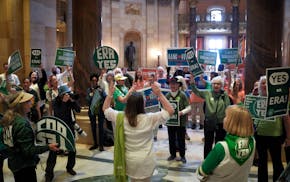RACE FOR GOVERNOR
On debates, Dayton, Emmer and taxes
So Tom Emmer is skipping a debate in greater Minnesota ("Emmer passes on fourth debate," Aug. 18). Apparently he is even more like Gov. Tim Pawlenty than we thought. Pawlenty has ignored Minnesota to pursue national ambitions; now Emmer is ignoring Minnesota voters.
Call me old-fashioned, but I'd like our next governor to care enough about the state to actually show up.
ROBYNNE CURLEE, MINNEAPOLIS
• • •
Mark Dayton's "tax the rich"' campaign slogan is so distasteful, I am embarrassed for its author.
The very thought that citizens who likely made better decisions (and who studied, practiced, worked harder, sacrificed more and took bigger risks) should be forced to pay a higher rate of taxes than those who did less to prepare for life defies logic.
I am no more inclined to go next door and steal my neighbor's lawnmower because it is better than mine than I am to ask my government to tax his earnings at a higher rate than mine. It's the same thing.
TOM R. BRAUN, ST. Paul
• • •
I was one of the 182,000 people who voted for Mark Dayton.
It's funny how commentary writer Matt Peiken ("The yet-to-be-distinguished Mr. Dayton," Aug. 17) forgot Dayton's biggest U.S. Senate accomplishment: He voted against the war in Iraq.
Why wasn't that on the review of his record?
Dayton is a class act.
SHEILA FOSS, Minnetonka
• • •
If you listen to the current level of aggressive, negative television ads by the politicians running for governor, it would seem that we will end up with only the best of the worst.
NORMAN HOLEN, RICHFIELD
Economic system
Free markets often have unintended costs
Flat-earthers such as Kevin Hassett ("Made in America, at what cost? Aug. 18) say the dirty job of manufacturing things should go to the lowest bidders on earth.
But wait, you say: That will cause millions of Americans to lose their jobs.
Sadly, replies the flat-earther, that is the inevitable result of the "natural economic process" of global free markets.
What exactly is a "free market" free of, you ask? Freedom from any responsibility for financing those whose human rights or environmental practices are illegal in the United States.
But if there are so many inevitable casualties here in the U.S., who will be left to buy your products?
Not to worry! We have global free markets. Consumers in other countries will buy our products.
As for you, Mr. and Mrs. Unemployed American Dirty Laborer Person, put your thinking caps on, because in this new, natural, inevitable "ideas economy," all of us will make livings by thinking up thoughts and selling intangible things. Like, you know, credit default swaps.
DAN MACKERMAN, LAUDERDALE
Philanthropy
Daughter disagrees with dad's commentary
As a certified public accountant, and as the daughter of Vernon J. Vander Weide, the attorney who wrote the Aug. 11 commentary "Philanthropy can have its drawbacks," I am inspired to respond.
Philanthropy does, indeed, have its drawbacks. As always, with tax law and general aversion to paying tax, time has changed the application of the original intent of tax deductions for charitable contributions to a nearly unrecognizable version in many cases. The nonprofit world has become big business, nearly an economy unto itself.
The Internal Revenue Service is well aware of this and has turned a skeptical eye toward the operation and reporting requirements of nonprofit organizations.
As a practicing CPA, I fill the role of advising both donors seeking a tax deduction for their charitable donations and nonprofit organizations seeking to earn those donations to further their exempt purpose. To add to the author's discussion of how philanthropy shrinks the tax base, I have two comments:
First and foremost, a large part of the cash donations do not go to a "dead hand" in the hands of the nonprofit organizations. Those cash donations go to pay the taxable salaries of employees (8.7 million full-time employees at an average wage of $21.68 per hour in 2007), services, overhead, and many other costs that are taxable in the hands of those who receive money in exchange for doing business with nonprofits, thereby effectively returning the wealth transferred from donors back to the private sector via taxable transactions.
There is, of course, the differential between the tax rate at which the donor received the deduction and the tax rate paid by the service provider.
Secondly, the "dead hand" does exist in other forms of donations, and those forms of deduction are worthy of further discussion here and in Washington. Predominant in these forms of deduction is the conservation easement, whereby land owners can encumber their property, sacrificing development rights and receiving a charitable deduction for the fair value of the encumbrance, but rarely sacrificing any rights to their property other than the development rights.
For these types of donations, the tax base has been reduced; the contribution was not in the form of cash that went to a social good, and it is rare that the public will have any rights to use of the property, even for recreational purposes. However, this could still be an unalloyed benefit to society if all who have given up the benefit of services provided by federal tax dollars agree that a view of open space owned by others is worth their sacrifice.
Daughters and fathers love to disagree; CPAs and attorneys can sometimes agree depending on who they are representing. When the issue revolves around tax law vs. social good, they will always split hairs.
JENNIFER L. VANDER WEIDE, MISSOULA, MONT.

Let voters decide on Equal Rights Amendment

Readers Write: Graduation, child care, midwifery, Timberwolves fans

How to avoid an Uber/Lyft disaster



